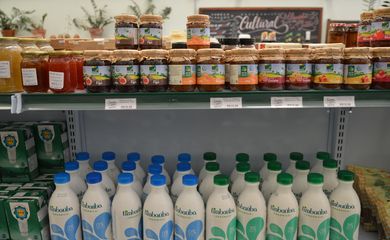Brazil tackles challenge of selling more value-added goods
Brazil’s exports portfolio is known for the prevalence of the basic goods. According to official data, from January to August this year, non-manufactured goods have headed Brazil’s export revenues. Industrialized products, in turn, whose manufacturing requires technology, reached considerably lower levels. The equation is not well regarded by economists, as Brazil’s balance of trade is forced to rely on the ups and downs of currency exchange rates for basic products, also known as commodities.

From January to August, soybeans were reported to account for 33 percent of the sum exported, followed by petroleum crude oils, with 19.56 percent, and iron ore, with 15.96 percent. Meanwhile, manufactured items were significantly less represented, like passenger vehicles, which added up to 6.71 percent in the same period for sales overseas. Value-added goods under food and drinks brought even less gains. To name but a few examples, in the first eight months of 2018, soft drinks and other non-alcoholic beverages, margarine, and grape wine totaled less than 0.01 percent of the total exported by Brazil each.
Efforts are being made to change this reality. Apex-Brasil, the Brazilian Trade and Investment Promotion Agency, has worked through its PEIEX export training program for executives—among them a number of small business owners—seeking to export their goods with the highest value added. The agency also reaches prospective clients, as was the case this week during LAC Flavors, a food and drinks fair held in Chile and organized by the Inter-American Development Bank (IDB). A mission put together by Apex took 62 Brazilian entrepreneurs to business rounds so they had a chance to showcase their products at the event.
Biotechnology
Among the attendants interested in taking their products beyond national borders is biologist Fernanda Matias, who runs biotechnology startup Meltech. Born in Mossoró, Rio Grande do Norte state, the company produces mead and kombucha, a probiotic (a product with live microorganisms) which is good for human health and also rich in flavor. “It’s a natural soft drink,” said Matias, who had the idea to found the company while trying to cope with the challenges facing her region.
“The region is rich in some products, one of which is honey. A few years ago, however, production fell considerably due to a shortage in rainfall. Bees started to die out families ran out of money. Since local public policies are lacking, people are not qualified to [continue extracting honey]. I considered started working with a value-added product, in an attempt to enable these families to once again produce,” the biologist explains. Fernanda Matias holds a PhD in Biotechnology.
Another initiative, Matias added, was spearheaded by a professor at the Federal Rural University of the Semi-arid Region (Ufersa), with courses offered to local producers. “Eventually, we got together. She learned about me, and I learned about her,” she recounted. Now, Matias is preparing for the intorduction of her goods into both the domestic and foreign markets. The company was born on the lookout for chances to export, she said, adding that she believes that the beverages will prove fairly successful abroad.
“Our products have unique features. The service life our kombucha lasts 12 months, whereas the usual period is three. We’ve patented its formula. Mead will come next. We’ll start everything together—both domestically and externally. When the firm was still in its incubation stage, two years ago, I had already joined PEIEX,” she said. The company has held talks with four countries—Argentina, Czech Republic, Costa Rica, and the UK, she went on to report.
Cachaça
With another typically Brazilian product, cachaça, executive Ademilson Tápparo, who owns Tápparo Engenho, in São José do Rio Preto, São Paulo state, also seeks a place in the international market. His firm, a family business active for over 40 years, has always sold its goods regionally, but Tápparo has recently signed deals to take his products to major supermarkets, and now he hopes that foreigners may let themselves be enchanted by chachaças such as Cabaré and Dom Tápparo. The entrepreneur also manufactures liquors and cocktails.
“The cost-benefit ratio for exports is better. The taxes we have to pay to sell domestically are way higher in Brazil. The tasting session we held [at LAC Flavors] was well received,” said the businessman, who was joined by his wife Agueda Tápparo. Chile, Costa Ricas, Australia, Czech Republic, Panama, Germany, Ecuador, and Paraguay are among the countries who expressed interest in the products, Tápparo said.
Value added
Apex Business Director Márcia Nejaim said that, even though basic products is the main focus of Brazil’s exports, the country has managed to stand out with industrialized products as well. “If you look at Argentina, the value added is impressive. The same could be said about the US. It’s true that Brazil is one of the most competitive countries in agribusiness. But investing in the industry of manufactured goods and technology is also key.”
Fabrizio Opertti, head of the trade and investment division of IDB, who paid a visit to LAC Flavors, argued that the countries should add value to products and services that are already part of their culture and particular features, and mentioned Brazil. “We must add value to our comparative advantages. A country like Brazil is a food superpower,” he declared.
*Reporter Mariana Branco traveled at the invitation of Apex-Brasil.




